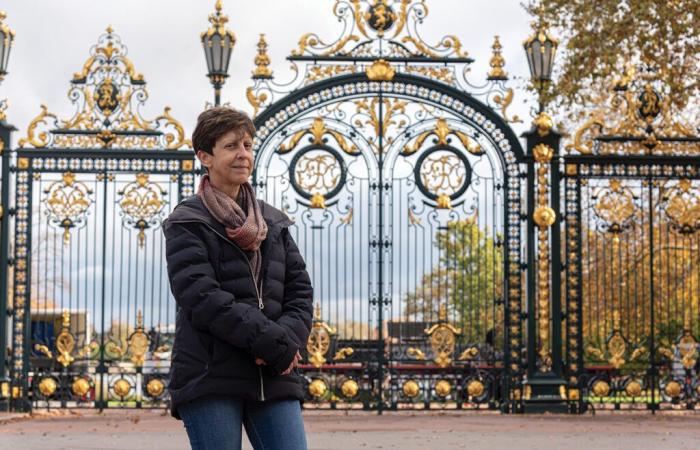Aline Cénédèse is a member of the Projet animals zoopolis (Paz) association which defends the cause of animals throughout France. In Lyon, activists launched a petition to demand the closure of the Tête-d'Or park zoo and the placement of the animals in suitable shelters. Far from being anecdotal, his fight also involves a new vision of society, where “human-animal” relationships must be rethought.
Lyon Capitale: Are you a big mouth?
Aline Cénédèse: No, I'm not a big mouth. On the other hand, when faced with cruelty to animals, I am revolted, it makes me angry. This is what drives me.
How did you go from a sensitivity for animals to militant commitment on their behalf?
There is my personal story. Before coming to live in Lyon, I grew up in the countryside surrounded by farm animals. Slowly, through cat rescues, I gradually mobilized when it was necessary to demonstrate, to work with associations but without necessarily being a member. It was the question of pigeons that made me take the plunge with Paz. They were gassed in atrocious conditions. It was difficult for me to see the extent to which they were mistreated in certain towns in the metropolis, including Vaulx-en-Velin. I wanted to approach town halls to encourage them to adopt less cruel models of regulation of the species, such as corn or contraceptive dovecotes. We do not allow animals to be killed or tortured for the simple reason that they bother us. Because deep down that’s what it is. The hygiene argument does not hold up. It has long been known that pigeons do not transmit dangerous diseases to humans unless they live with them permanently. This is all the more damaging because there are solutions that work. In Barcelona, the authorities managed to halve the pigeon population in just three years thanks to contraceptive corn. There are similar advances in Brussels. Why not with us?
Read also: In Lyon, 16 associations ask Grégory Doucet to close the Tête d’Or zoo
What is your opinion on the concept of “harmful”? There is no exception to the animal cause as with the mosquito?
I can't stand the suffering of animals. To date, we do not know whether mosquitoes are sentient. It's true that the overpopulation of mosquitoes is a horror for everyone, especially since – in this case – there can be diseases. It is not because we are animal rights activists that we are less stung than others. Personally, I recommend mosquito repellent to keep them away. Then, mosquitoes are not completely useless. In addition to filtering water, they are also part of the food chain and serve to feed many other species. We must also look upstream at the reason for their presence. Why are there so many mosquitoes? Because there are no more frogs or birds. It’s dramatic what’s happening to birds. The proliferation of mosquitoes is only a symptom. If we had not abused pesticides, if we had respected the habitats of birds in the city and in the countryside, there would also be fewer insects like mosquitoes. To answer you: the interests of animals must be taken seriously, whether it is a cow, a lion or a spider, and even rats. Why make them suffer with completely cruel traps, like glue traps? I remind you that it is not yet banned in France. And then, upstream, maybe if our trash management was better, we would have fewer rats.
When you are an animal rights activist, are you necessarily vegetarian?
Yes, even vegan – or vegan [éviter tous les produits d’origine animale, NdlR]. We need to see what is behind animal products. For example, to get milk, a calf is taken away from its mother on its first day, and they both cry. This is insane. And the calf is then fattened in atrocious conditions, only to end up in the slaughterhouse. The priority is to put an end to intensive breeding. Before, we ate one chicken a month. Now it's every day. When you buy a chicken leg for 2 euros, don't you think there's a problem? Between hormones, antibiotics, now mercury in tuna, what we find on our plates is crazy.
Are you decreasing? For a return to the traditional production model?
Personally, not at all. No going back. On the other hand, it seems essential to me to escape from the consumer society. I think that the right model is that of the local, the short circuit, but above all it is a mode where we stop considering the animal as a machine in the agri-food industry. Today, the objective of our system is no longer simply to feed the population, it is to provide us with an abundance of everything, even if it means sacrificing animals. When I was young, I don't think I ever ate salmon in my life actually. Why now does everyone want to eat salmon almost every day? It's absurd. The subject of defending the animal condition is very vast. For example, to ensure that lamb stocks are well stocked at Easter time, the French industry modifies the breeding periods of ewes by injecting them with hormones so that they all give birth to a lamb at the same time. The hormones in question are collected in “blood farms” from the placenta of mares that are made to ovulate continuously in South America, where it is still authorized. It is this type of practice that disgusts me and motivates my fight. We create gigantic means of production where the animal has no place, where it is reduced to an object of production. In other words, they are machines. As a result, we end up training biologists like engineers who are asked how to produce more with a sow.
Read also: In Isère, a petition demands an end to the sale of live fish in a Decathlon
Let's talk about Lyon, where your association is campaigning for the closure of the Tête-d'Or park zoo. What motivates your request?
I really invite the people of Lyon to look at the size of the animal cages. They are tiny. When we see giraffes who have large territories of several kilometers to several hundred square kilometers in the wild, but in Lyon their enclosure is tiny and without any trees with leaves to eat, it's cruel. I would like to know the consequences in terms of their physical and psychological health. You just have to look at the animals to realize that they are suffering. They have stereotypical gestures: for example, panthers run in circles. This is typical and should alert us. It really is a sign of deep unhappiness. This means they have nothing to do except eat and sleep. Monkeys normally live in communities in a complex environment. Is this really what you see behind bars?
But why point to this zoo? It is a public zoo, free and open to all. Aren't you fighting the wrong battle by attacking a public zoo before the private ones?
First of all, from the point of view of animal suffering, there is no public-private difference. Then, it is typically this type of fallacious arguments that the ecologists of Lyon offer us. They constantly hide behind disadvantaged populations. This is hypocrisy. I don't come from a particularly wealthy family either. That's not why I'm any less sensitive to the living conditions of zoo animals. We could put all this money elsewhere. These are still impressive sums. The zoo's Asian Forest alone cost 4.7 million euros. Small-scale populations could just as easily discover animals without making them suffer in the same way as others. Why not send classes of children to see the animals here? There is superb local wildlife and even in the Tête-d'Or park. Why not develop exhibitions? What difference does it make to go see an exotic animal? I haven't seen one for years and I'm doing well. I am convinced that it is not zoos that develop empathy for animals. This feeling cannot arise from the image of an animal behind a glass window. For me, it's entertainment and nothing else. These animals are reduced to the state of attraction. We can still have fun in other ways. Besides, children are not fooled. When we explain to them, they often understand very well that animals are unhappy in zoos.






